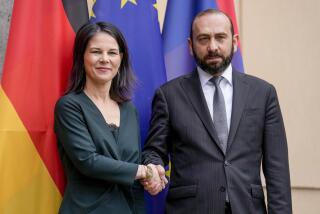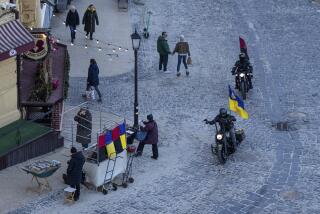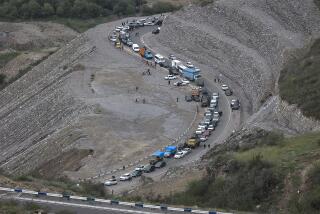On eve of peace talks, Syrian forces make fresh gains against rebels
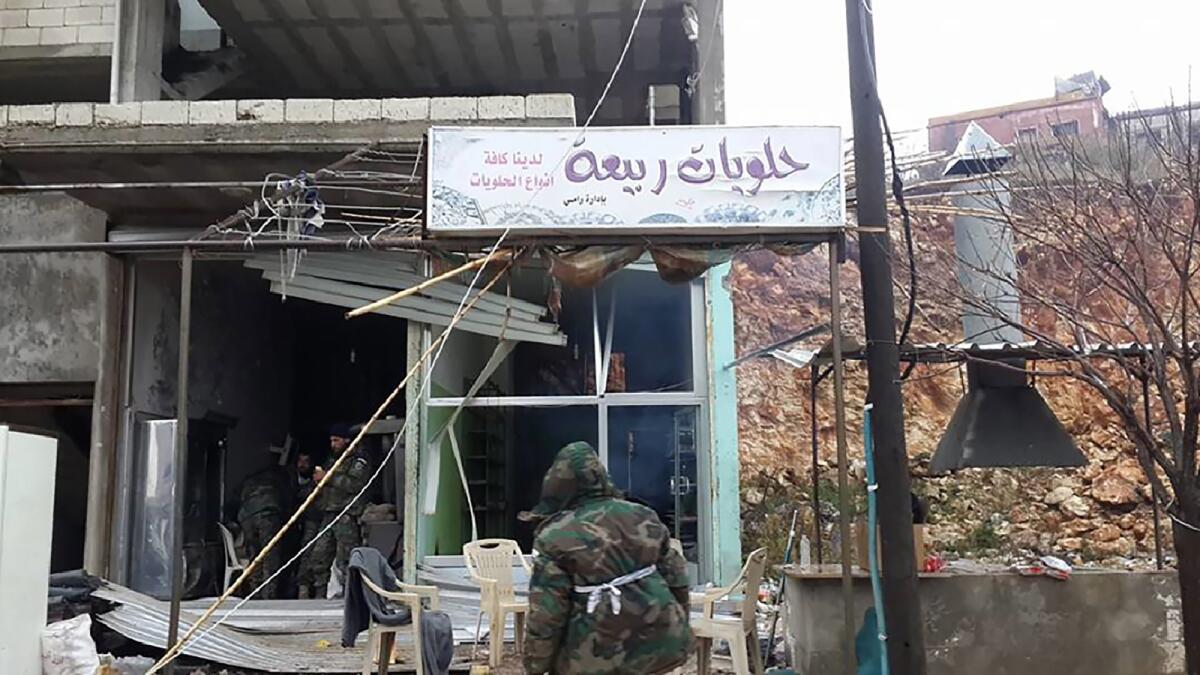
Syrian pro-government forces inspect a building in the town of Rabiaa in Syria’s coastal Latakia province on Sunday.
Syrian army troops have overrun rebel strongholds in the mountains of western Latakia province, according to government and opposition accounts on Sunday, marking the latest government gains before peace talks slated to begin this week in Geneva.
Forces loyal to President Bashar Assad swept through the town of Rabiaa and nearby villages close to the Turkish border, according to the official Syrian media and a pro-opposition monitoring group.
The army advanced “after violent clashes against Islamic battalions” including Jabat al Nusrah, the official Al Qaeda franchise in Syria, reported the Syrian Observatory for Human Rights, a pro-opposition monitor based in England. Syrian and Russian war planes backed the thrust, the observatory said.
See more of our top stories on Facebook >>
Since Sept. 30, when Moscow first began its aerial combat operations in Syria, Russian warplanes have made more than 5,600 sorties and launched almost 100 airborne and seaborne cruise missiles in support of Assad’s government, according to the Russian Defense Ministry. The Russian intervention has helped turn the tide of battle on several fronts, including Latakia, boosting the fortunes of Assad’s government as United Nations-peace talks are set to convene in Geneva this week
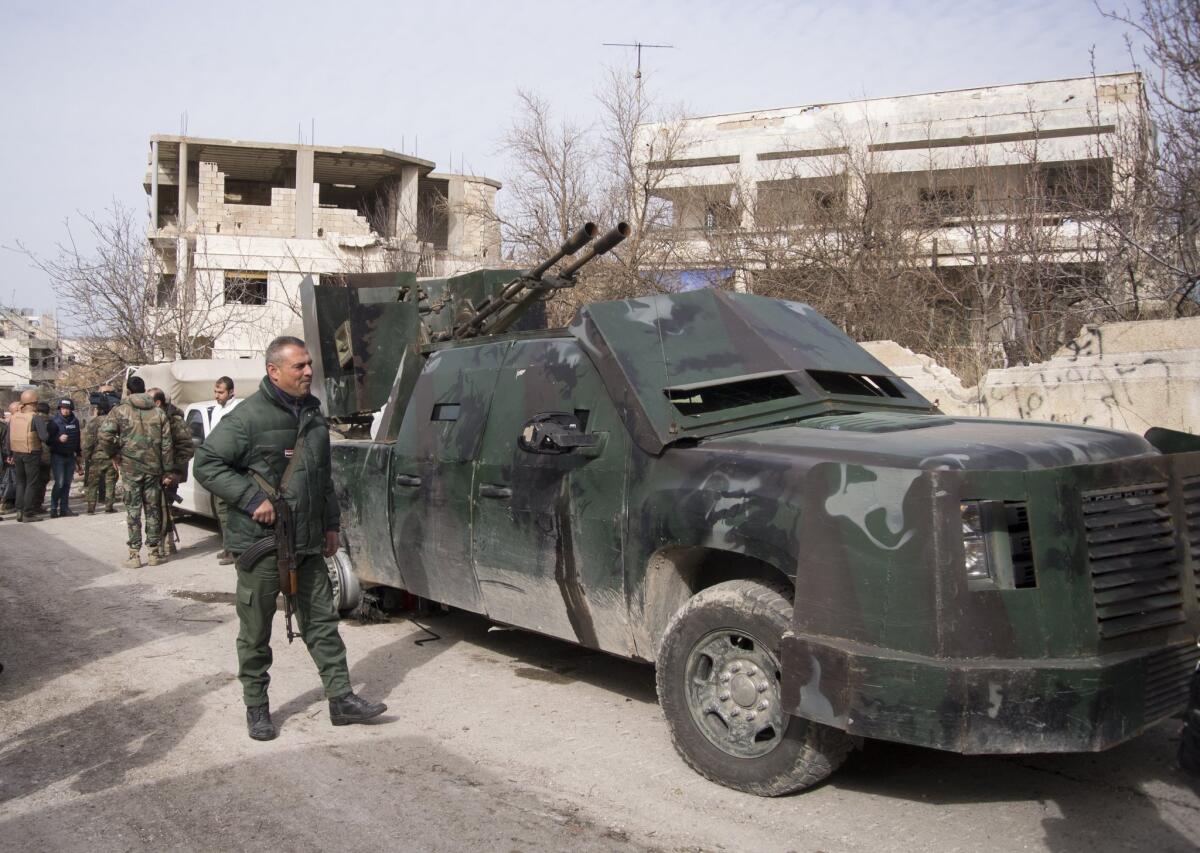
Syrian soldiers stand at a pickup truck with a gun mount in Salma, Syria, on Jan. 22, 2016.
“The Russian intervention has really changed the rules of the game,” said Fawaz Gerges, professor of Middle Eastern politics at the London School of Economics. “The Syrian army has shifted from a defensive mode into an offensive mode.”
While the Geneva talks are scheduled to begin Monday, officials say a delay of at least a day is likely because of a dispute about who will represent the opposition delegation.
Still, officials from the United States and Russia — two principal backers of the Geneva talks -- have said they are optimistic that the negotiations will take place. Washington and Moscow are on opposing sides of the Syrian conflict, but the two nations say a political settlement is needed to end the punishing conflict.
“We are confident that with good initiative in the next day or so, those talks can get going,” Secretary of State John F. Kerry said Saturday in Riyadh, Saudi Arabia.
The Obama administration has backed away from its longtime insistence that Assad step down from office as part of any U.N.-backed transition process in Syria.
A Saudi-backed coalition that includes a number of hard-core Islamist groups insists it should be the sole opposition representative in Geneva. The group has threatened not to attend the talks if other opposition factions are invited.
But Russia, which backs Assad’s government, has objected to the composition of the Saudi-backed group and has called for a broader opposition delegation. Moscow wants to see a leading Syrian Kurdish political party invited to Geneva and also seeks enhanced secular representation among opposition delegates.
Unconfirmed reports were circulating on Sunday that the United Nations might invite two separate opposition delegations to the Geneva talks in an apparent compromise.
The U.N. special Syrian envoy, Staffan de Mistura, is expected to provide further details about the status of the talks on Monday in Geneva.
A projected timetable for the Geneva peace process envisions a cease-fire within six months and United Nations-administered elections in 18 months, after the drafting of a new constitution. However, diplomats concede that plan is optimistic and are looking for more modest achievements, such as localized cease fires and humanitarian access to blockaded zones.
“This is the start of a very prolonged process,” said Gerges. “It could take months, it could take years.”
The Syrian conflict, now raging for nearly five years, has cost more than 200,000 lives and resulted in more than 4 million Syrians having fled their homeland, while millions more have been displaced within Syria. The war has further destabilized the Middle East and contributed to the migrant crisis now confronting Europe.
On the battlefront in Syria, government forces have long sought to expel rebels from Latakia, Assad’s home province and a government mainstay. The coastal province also houses the principal airbase used by Russian bombers and fighter jets.
Syrian Army engineering units arrived in the newly captured areas in Latakia to dismantle roadside bombs and mines planted by the “terrorists,” reported the official Syrian media, which refers to all armed rebels as terrorists.
The fall of Rabiaa, which has been in the hands of Islamist rebels since 2012, is the culmination of a months-long campaign to drive out the opposition from Latakia province.The loss of Rabiaa comes less than two weeks after government forces overran the town of Salma, another former rebel bastion in the mountains of Latakia.
Opposition fighters fleeing Rabiaa escaped toward nearby Turkey, the government said.
Turkey, which shares a more than 500-mile border with Syria, has long provided sanctuary and logistical support for Syrian opposition fighters, including Islamic militants. Turkish President Recep Tayyip Erdogan has made ousting Assad’s government a centerpiece of Ankara’s foreign policy.
Bulos is a special correspondent.
Follow @mcdneville for news from the Middle East
ALSO
Despite theologians’ disapproval, more Iranians are discovering the joy of pets
In Jordan, Sudanese live in fear of deportation
Tunisia unrest leads to nationwide curfew
More to Read
Start your day right
Sign up for Essential California for news, features and recommendations from the L.A. Times and beyond in your inbox six days a week.
You may occasionally receive promotional content from the Los Angeles Times.
